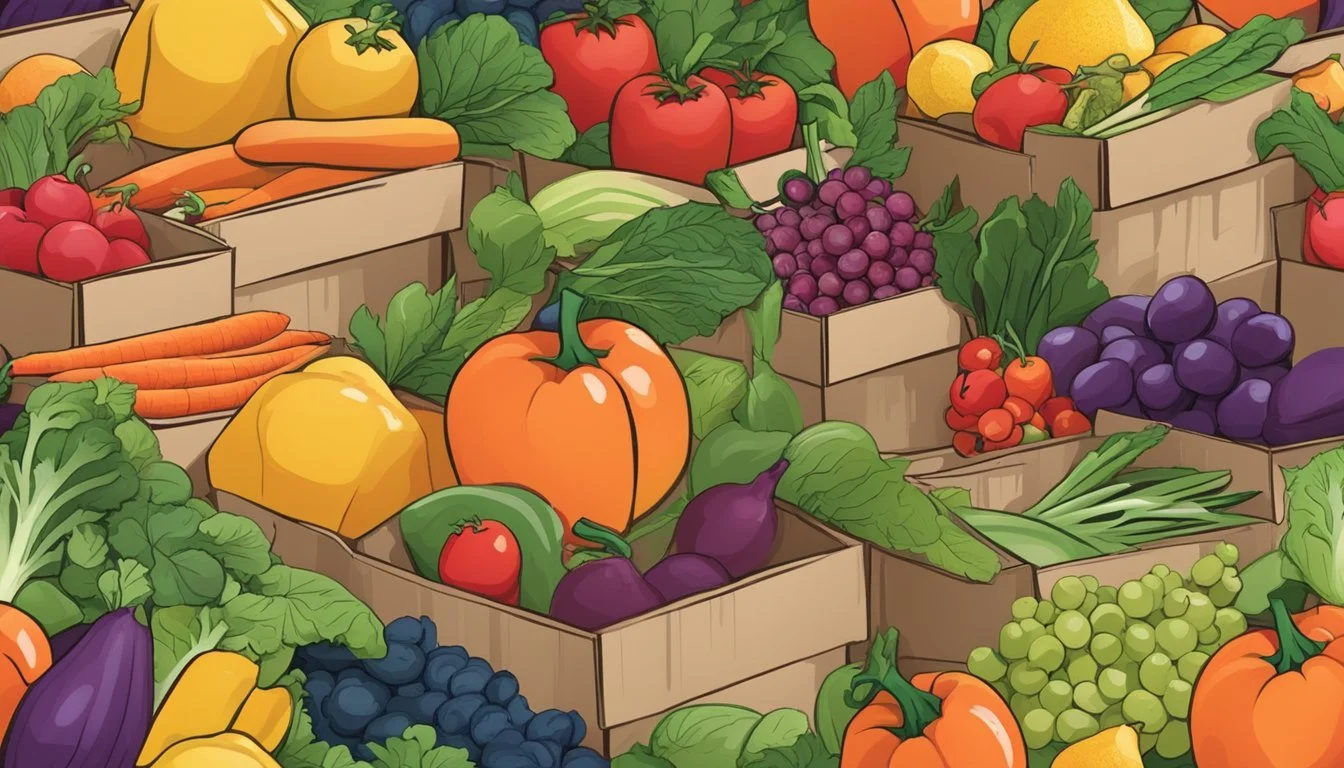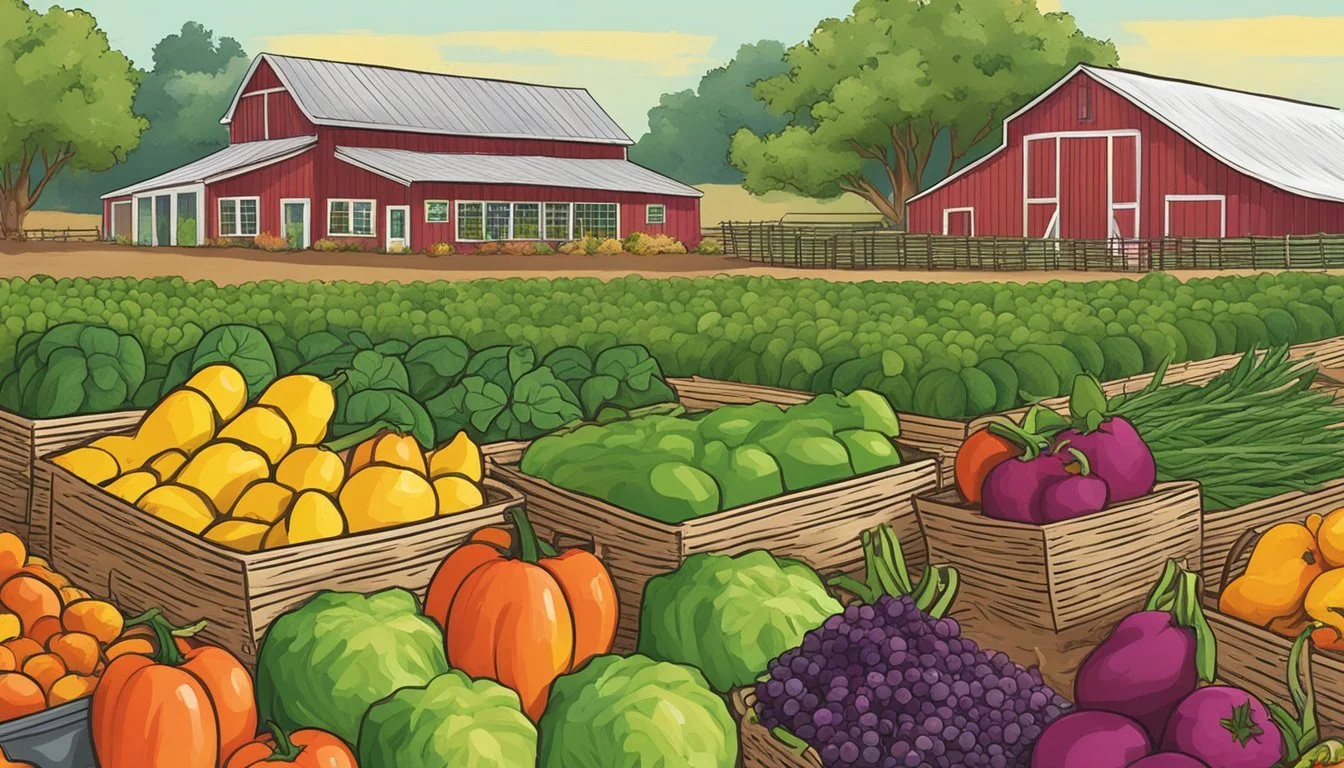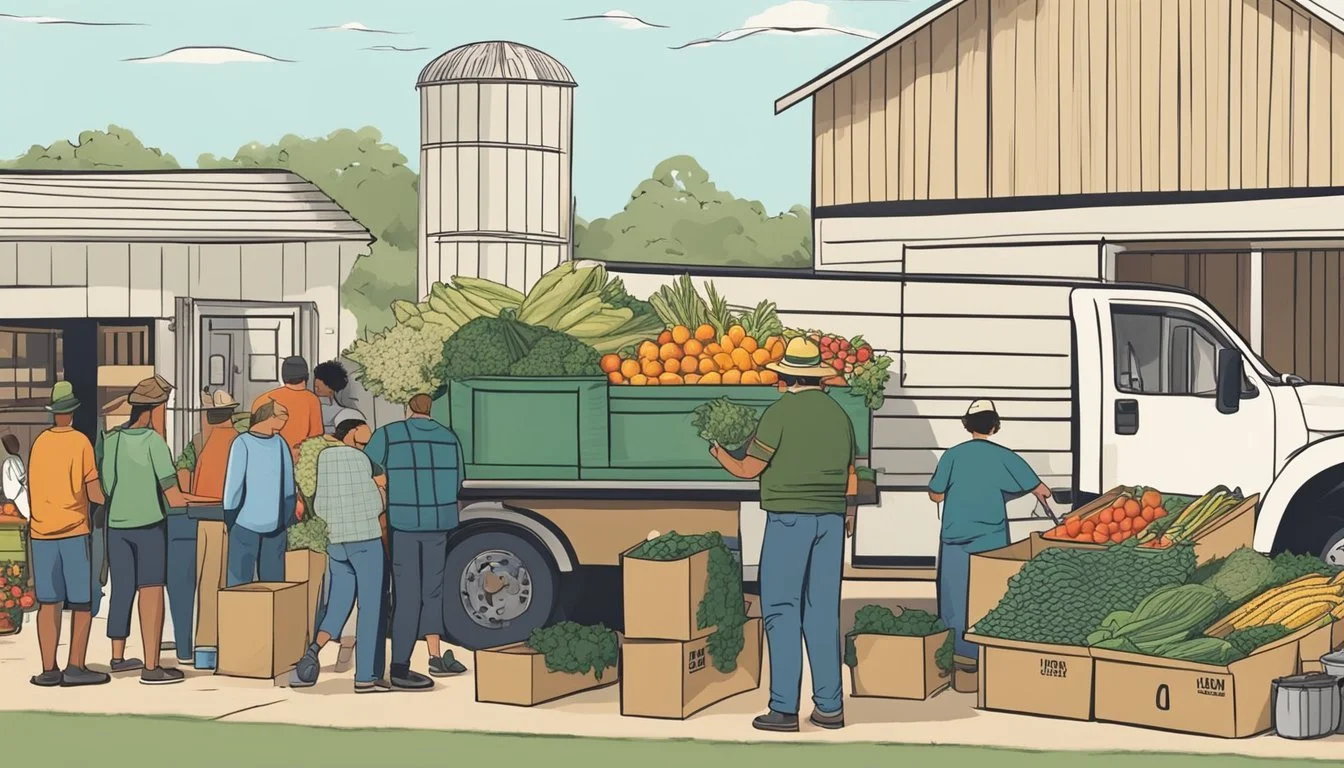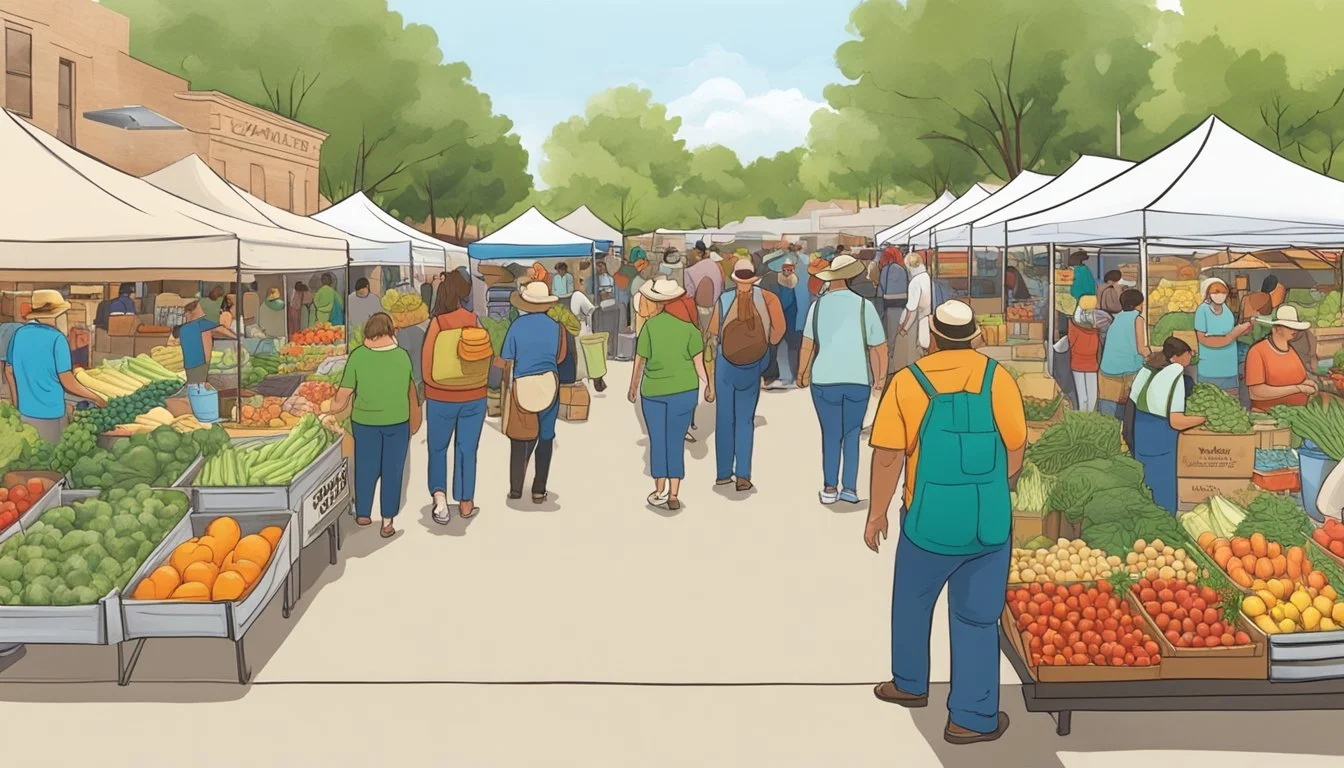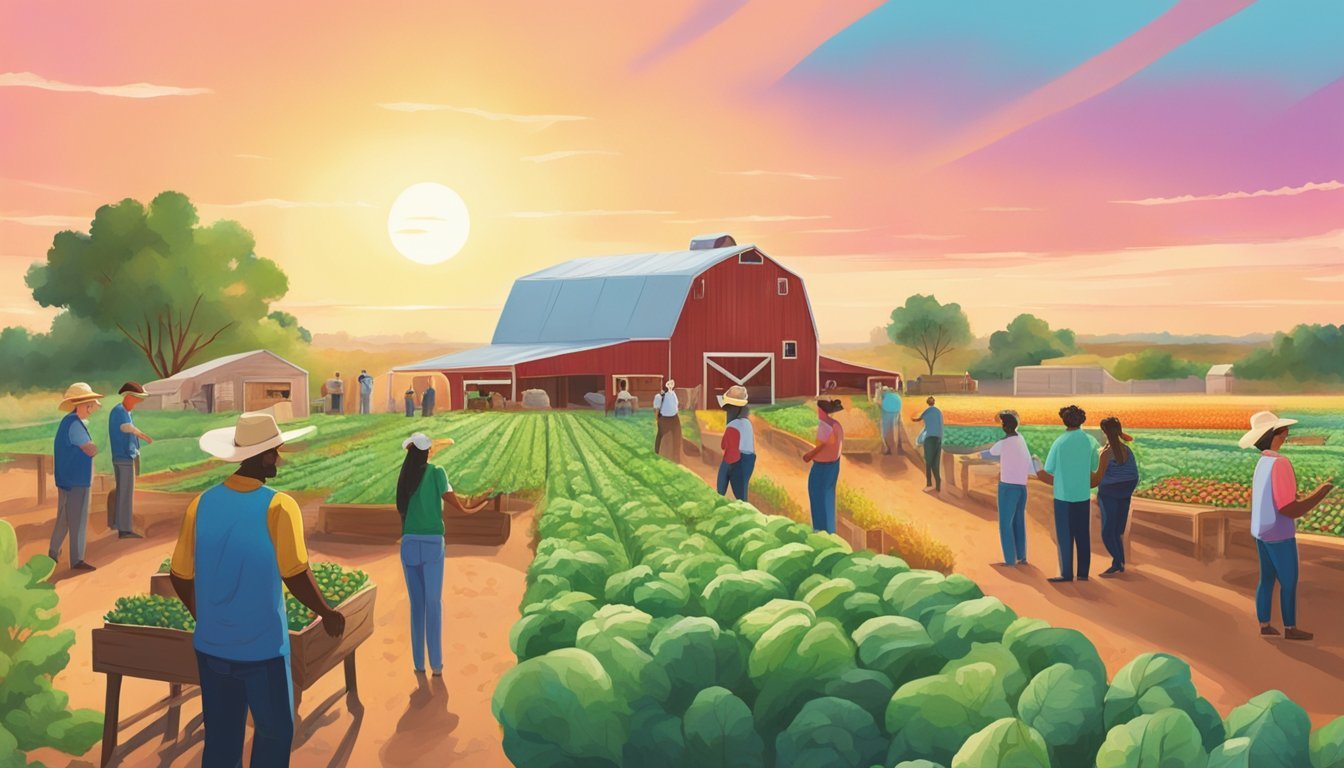Community Supported Agriculture (CSA) in Lubbock, TX
Benefits and How to Join
Community Supported Agriculture, commonly known as CSA, is a farming model that has taken root in Lubbock, TX, mirroring its growing popularity across the nation. This model allows consumers to buy local, seasonal food directly from farmers, fostering a closer connection between growers and consumers. In Lubbock, the CSA system is thriving due to a supportive local community that values fresh, organically grown produce. Members of a CSA typically purchase a share at the beginning of the growing season and, in return, receive a regular delivery of farm-fresh produce throughout the harvest period.
By participating in a CSA, residents of Lubbock have the opportunity to indulge in a diverse array of fruits and vegetables grown within their local food system. The system bolsters the local economy, sustains small-scale farms, and promotes sustainable agricultural practices. Key players in Lubbock's CSA scene, such as E3 Farms and Elle Farms, have been instrumental in providing a reliable source of organic produce to the community. These farms demonstrate their commitment to the environment and the health of their customers by either practicing or transitioning toward organic certification.
Given the city's warm climate and agrarian heritage, Lubbock serves as a conducive environment for CSAs to flourish. The initiative has seen a positive response from the community, fostering a sense of shared investment in the success of local agriculture. It's a synergy where everyone benefits—farmers receive upfront support and a guaranteed market for their produce, while shareholders enjoy the bounty of fresh, locally-grown food. As such, Lubbock's foray into Community Supported Agriculture not only nurtures healthier lifestyles but also engenders a robust linkage between the farm and the urban table.
Understanding CSA
Community Supported Agriculture, or CSA, is a farming model that fosters a close bond between farmers and consumers, emphasizing sustainable and potentially organic farming practices.
History and Principles of CSA
CSA originated in Europe and Japan during the 1960s and found its way to the United States in the mid-1980s. The principles of CSA rest on a mutual commitment between the farmer and the community. This model operates on trust and shared risk, as community members pledge to support farms and farmers, thereby providing a reliable market for their produce.
The CSA Model Explained
In the CSA model, consumers purchase shares or memberships from local farms. A typical share includes a weekly or biweekly distribution of a farm's produce during the growing season. Shares often include a variety of vegetables and may also contain fruits, eggs, dairy, or meat.
Typical Structure of the CSA Model:
Pre-season Investment: Consumers pay for their share before the harvest, providing capital for the farm.
Regular Distribution: Participants receive fresh, seasonal produce periodically.
Shared Risk and Reward: Both the farmer and the consumer share in the risks of farming, including poor harvests due to weather or pests, as well as the bounty of successful crop yields.
CSA Benefits to Farmers and Consumers
Farmers benefit from the CSA model through financial security and market assurance. They gain upfront capital, reduce marketing costs, and nurture a direct relationship with their consumers. Consumers enjoy access to fresh, local, and often organic produce, contributing to their health and the health of the environment.
Benefits at a Glance:
For Farmers:
Financial stability with pre-season funding
Reduced marketing and distribution costs
Stronger relationships with consumers
For Consumers:
Exposure to new varieties of fruits and vegetables
Engagement with and support for local agriculture and sustainable practices
In Lubbock, TX, CSA farms like Elle Farms are adopting these principles and engaging with the community to offer diverse, seasonal produce, possibly transitioning to organic certified agriculture.
How CSA Works
Community Supported Agriculture in Lubbock, TX, operates through direct partnerships between local farmers and community members. Through subscriptions, members receive regular shares of fresh produce, thereby supporting local agriculture while enjoying seasonal offerings.
CSA Subscriptions and Memberships
Subscriptions to a CSA provide individuals with the opportunity to become members of a local farm. Members pay upfront at the beginning of the growing season, which allows the farmers to plan for production and cover initial agricultural costs. In return, members are promised a portion of the farm's harvest, commonly known as shares. These shares often include a variety of vegetables and, at times, other farm products like eggs.
Seasonal Produce and Share Types
The content of CSA shares is heavily dependent on what is seasonally available. Shares are typically compiled on a weekly or bi-weekly basis and can vary in size. In Lubbock, CSA offerings may include locally grown items such as tomatoes, peppers, leafy greens, root vegetables, and orchard fruits. Many CSAs also offer different types of shares tailored to individual or family needs, and some provide more specialized options, such as only fruit or only vegetables.
Distribution and Pick-Up Points
Members receive their fresh produce through designated distribution centers or pick-up points. Some Lubbock CSAs may deliver directly to homes, while others might have central locations where members can collect their shares. These pick-up points are often communicated in advance to members, ensuring they know where and when to retrieve their fresh, local produce. Successful CSA models rely on this regular and organized method of distribution, which fosters an ongoing relationship between the farm and its members.
Local Impact
Community Supported Agriculture (CSA) enriches the Lubbock community by bolstering the local economy, supporting area farmers, and strengthening food security through active community engagement.
CSA's Role in Lubbock's Local Economy
In Lubbock, TX, CSAs play a pivotal role in the local economy. By participating in CSA programs, residents invest directly in local farms, keeping the financial benefits within the community. This model helps small farms sustain operations and grow, creating jobs and contributing to the vibrancy and resilience of Lubbock's economy.
Supporting Local Farmers in Lubbock
Local farmers gain significant support from CSA members. This partnership allows farmers to receive funds upfront, reducing the financial risks associated with farming. In turn, Lubbock's farmers can focus on environmentally sustainable practices and supply the community with fresh, locally-grown produce. By linking directly with consumers, farmers also receive immediate feedback, fostering ongoing improvement and innovation.
Food Security and Community Engagement
CSAs are integral to promoting food security in Lubbock by ensuring a steady supply of fresh produce to the community, including local food banks. Moreover, they engage residents in the food production process, creating a sense of community around shared values and resources. This engagement not only educates members about seasonal eating and local agriculture but also solidifies the bond between consumers and those who grow their food.
Choosing a CSA in Lubbock
When selecting a CSA in Lubbock, TX, prospective members should prioritize their dietary needs and the practicality of their commitment to a local farm. They should examine the factors that are pivotal in their decision, understand the specifics of CSA contracts, and get to know the CSA farms available in Lubbock.
Factors to Consider
Before committing to a CSA in Lubbock, individuals should evaluate a variety of factors to ensure their subscription aligns with their needs. They should consider:
Type of Produce: Some CSA farms in Lubbock may focus primarily on vegetables, while others might offer a range of produce including fruits, and sometimes additional farm products.
Subscription Length: Many CSA farms offer different lengths of subscription, often ranging from a single season to a full year.
Pick-up Locations: Accessibility is key; choosing a CSA with a convenient pick-up location is crucial.
Organic Certification: For those interested in organic produce, verifying if a CSA is certified or in transition to becoming certified, as indicated by databases like LocalHarvest, can be an essential factor.
Understanding CSA Contracts
CSA contracts are binding agreements between the consumer and the farm, and understanding them is critical for a successful CSA experience. Individuals should be aware of:
Payment Schedule: CSA members usually make a one-time payment up front, but some farms may offer payment plans.
Share Options: Contracts should outline what is included in the share, whether it is farmer's choice or if there is an option for customization.
Distribution Details: The contract will detail the frequency of distributions as well as the start and end dates. Members should ensure they're comfortable with these terms.
CSA Farms in Lubbock
Lubbock hosts several CSA farms, each with unique offerings. Specific farms can be found and researched through resources like the LocalHarvest database. Examples include:
Elle Farms: Elle Farms offers a summer share starting in June and aims to add other season shares as it grows. Focused on sustainable organic farming, it is in the process of becoming organically certified.
E3 Farms: Originally a small farm in Lubbock, it now plays a substantial role at the Lubbock Downtown Farmers Market and Wolfforth Farmers Market. E3 Farms has a presence at these markets from June to October, and offers produce year-round at Wolfeorth.
Prospective CSA subscribers in Lubbock should consider these details to make an informed decision that supports their dietary preferences and lifestyle while bolstering the local food system.
Beyond Produce
Community Supported Agriculture in Lubbock, TX offers an array of products that extend well beyond fresh fruits and vegetables. Patrons can enjoy a diverse selection of farm-fresh items and engage in community-centric activities.
Eggs, Cheese, and Other Farm Products
Many CSA programs in Lubbock provide eggs and cheese, ensuring customers have access to a full spectrum of farm-to-table options. These items are known for their superior freshness and quality, often coming from free-range chickens and grass-fed dairy cows.
Eggs: Fresh from the farm, local CSA subscribers can savor the rich flavor of eggs directly from chickens raised in pastured environments.
Cheese: Artisanal cheeses, including traditional cheddar, creamy goat cheese, and other varieties, are crafted using milk from local dairies.
Farm products also include an assortment of peppers ranging from sweet bell to zesty jalapeños, catering to those who appreciate both the mild and the fiery.
Community Events and Volunteer Opportunities
CSAs in Lubbock foster a strong sense of community through hosted events and volunteer programs. Subscribers can participate in seasonal gatherings, educational workshops, and hands-on farming experiences.
Community Events: These can include harvest festivals, cooking demonstrations using produce and farm products, and meet-and-greets with the farmers.
Volunteer Opportunities: Members of the CSA are often invited to help on the farm, which can involve planting, tending to chickens, or assisting during community events.
These programs not only deepen the connection between consumers and their food sources but also strengthen community ties.
Getting Involved
For those interested in supporting local agriculture in Lubbock, TX, there are ample opportunities to get involved directly with community-supported agriculture (CSA). Participation ranges from volunteering on farms to engaging in educational programs.
Volunteering on a CSA Farm
Volunteers are welcomed by CSA farms like E3 Farms and Elle Farms, where people can contribute hands-on in the cultivation of sustainable and potentially organic produce. E3 Farms, which operates at local Lubbock markets, and Elle Farms, a developing CSA farm, offer community members a chance to learn about sustainable farming practices firsthand.
Tasks for volunteers can include:
Planting and harvesting crops
Assisting with farm maintenance
Helping during market days
Educational Resources and Workshops
Elle Farms offers educational resources and workshops designed to deepen understanding of sustainable farming practices and the importance of CSA in the local food system. The transition to becoming a certified organic farm highlights their commitment to sustainable agriculture education.
Workshops may cover:
Organic farming techniques
Seasonal planting guides
Environmental impact of local food systems
By participating in volunteering and educational opportunities, individuals contribute directly to the strength and sustainability of their local food system.
CSA Management and Promotion
Community Supported Agriculture (CSA) management in Lubbock, TX harnesses advanced technology to streamline operations while strategic marketing efforts promote farm shares to a local audience.
Using Technology to Manage CSAs
Managing a CSA in Lubbock demands meticulous organization of member data, share options, and distribution schedules. Software solutions such as CSAware provide a centralized database, simplifying tasks for farm managers. The use of CSA management software allows for efficient:
Tracking of member subscriptions and preferences
Distribution of produce, facilitated by detailed member pick-up logs
Record-keeping through a comprehensive API that integrates with other digital tools
The software typically includes an online EBT (Electronic Benefit Transfer) support, enhancing the accessibility of CSA shares to a wider community by accepting government-issued food assistance benefits.
Marketing Strategies for CSA Farms
CSA farms in Lubbock employ diverse marketing strategies to reach potential members:
Digital Presence: A robust online platform showcasing the farm's offerings and share options, utilizing social media to engage with the community.
Local Markets: Presence at Lubbock Downtown Farmers Market and Wolfforth Farmers Market from June to October, leveraging face-to-face interactions.
Events and Promotions: Celebrating events such as CSA Day to encourage sign-ups and using hashtags like
#CSAdayfor online visibility and community engagement.
Each strategy is designed to emphasize the freshness and quality of the produce while supporting local agriculture. The market manager plays a pivotal role in executing these strategies and ensuring a consistent message across all marketing channels.
Advantages of CSA
In Lubbock, TX, Community Supported Agriculture (CSA) programs offer a host of benefits that are crucial for both consumers and producers. These advantages stem from the practice's commitment to sustainability and the fostering of robust relationships between consumers and farmers.
Sustainability: Through CSAs, members receive food that's often produced with sustainable agriculture practices. These methods minimize the carbon footprint and promote environmental health. CSA farms in Lubbock may employ techniques likened to organic farming, which avoid harmful pesticides and synthetic fertilizers, supporting biodiversity and soil health.
Freshness and Nutrition: Consumers benefit from the freshest produce, sometimes picked the very day of delivery. Without the need for long-distance transportation, CSA produce retains more nutrients and arrives in kitchens with peak flavor and vitality.
Supporting Local Farms: By investing in CSA shares, consumers directly support local farmers' financial stability. This capital enables farmers to plan their crops with greater certainty and provides them with a dependable market.
Educational Aspect: Consumers learn where and how their food is grown, which can deepen their understanding of sustainable agriculture. Farmers often share knowledge about their farming practices, creating an enlightening experience for members.
Strengthened Community Ties: The relationship built through CSA creates a sense of community and shared purpose. It's not just a transaction; it's a partnership where both parties learn from each other and work together toward common goals.
Economic Benefits: The local economy benefits as dollars remain within the community, promoting the viability of local farming and ancillary businesses.
In conclusion, CSA programs in Lubbock, TX, encapsulate the essence of community and sustainability, offering an array of advantages that resonate with a commitment to health, local economy, and the environment.
Culinary Inspiration
Community Supported Agriculture (CSA) programs in Lubbock, TX, are fertile grounds for culinary exploration. Local CSAs provide a variety of fresh, seasonal produce that can transform a simple meal into a vibrant feast for the senses.
A CSA basket typically includes ingredients that are at their peak flavor. Here are some tips and recipes to inspire cooking with CSA produce:
Seasonal Salads: Mix leafy greens with colorful vegetables like tomatoes and radishes. Toss with a homemade dressing using local herbs and honey.
Hearty Stews: Use root vegetables and winter squash from your CSA box to create rich stews. Pair with local meats for added depth.
Preserves: Transform excess fruits into jams or pickled vegetables to savor the flavors year-round.
The key to cooking with CSA produce is flexibility. Recipes may need to be adapted based on what's available that week. Here's a simple framework for a CSA-inspired dish:
Start with a base (grains or lettuce)
Add a variety of vegetables
Include a protein (beans, cheese, or local meats)
Dress with a simple vinaigrette
Residents of Lubbock can look to CSAs for not just ingredients, but also for inspiration. Embracing the CSA model opens one up to a world of fresh, sustainable, and creative cooking opportunities.

